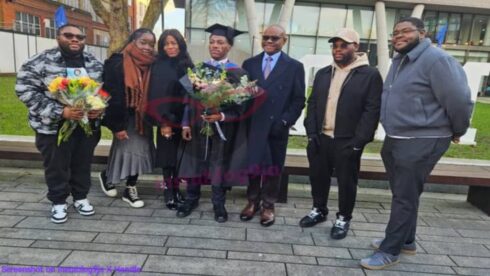The Federal Capital Territory (FCT) Minister, Nyesom Wike, recently celebrated a proud moment in his family as his son graduated from a prestigious university in the United Kingdom. The joyous occasion, attended by close family and friends, was a testament to years of hard work and dedication. However, the high-profile nature of the event has garnered attention both locally and internationally, with many applauding the family’s milestone. The story quickly spread across news platforms, sparking conversations about education, privilege, and governance in Nigeria.
While the Nyesom Wike family basked in the pride of their son’s academic achievement, critics have seized the moment to question the choices made by Nigerian political elites regarding education. The decision to send children abroad for studies, often at significant financial cost, contrasts sharply with the state of Nigeria’s struggling education sector. This development has reignited discussions about the brain drain phenomenon and the growing trend of students seeking quality education outside the country, raising critical questions about the priorities of Nigeria’s leadership.
The Graduation: A Proud Moment for the Wike Family
Nyesom Wike, known for his vibrant personality and bold political moves, appeared jubilant as he attended the graduation ceremony with his family. Clad in a tailored suit and surrounded by loved ones, the minister was seen applauding his son as he received his degree.
The university, reputed for its academic excellence, marked the culmination of years of rigorous study for the younger Nyesom Wike. Friends and family members shared heartfelt messages on social media, with many describing the day as a testament to the minister’s dedication to his family’s welfare.
Public Reaction: Celebration Meets Criticism
The announcement of the graduation has been met with mixed reactions back home in Nigeria. Supporters of the minister have congratulated him, hailing the achievement as a proud moment for any parent. Some argue that it highlights Nyesom Wike’s commitment to securing a bright future for his children, regardless of location.
However, detractors have been less enthusiastic, questioning the ethics of public officials sending their children abroad for education while the nation’s education sector struggles with underfunding and strikes. This dichotomy has fueled intense debates across social media platforms and editorial columns.
The Larger Debate: Education Abroad vs. Nigeria’s System
Nyesom Wike’s son’s graduation is not an isolated case but part of a broader trend among Nigeria’s political class. Many leaders have been criticized for prioritizing foreign education for their families, often at institutions costing thousands of dollars annually. Critics argue that such actions undermine their commitment to improving the local educational system.
This development raises critical questions: If Nigeria’s leaders do not trust the local education system for their children, how can they convince the public of its viability? Furthermore, the perception of a double standard continues to erode public trust in governance.
Nyesom Wike’s Defense: A Father’s Right to Dream
In response to the criticisms, sources close to Nyesom Wike argue that his decision stems from his desire to provide the best opportunities for his children. They emphasize that every parent, regardless of social status, aspires to give their offspring the tools to succeed in life.
Nyesom Wike, a seasoned politician and former governor of Rivers State, has long been an advocate for infrastructure development and youth empowerment. His allies argue that his actions should not overshadow his contributions to national development and governance.
Implications for Nigeria’s Political Elite
The graduation of Nyesom Wike’s son is a microcosm of a larger issue within Nigeria’s political and social fabric. It underscores the increasing disconnect between the ruling class and the populace. While the elites enjoy the privileges of global access, ordinary Nigerians grapple with inadequate educational resources and opportunities.
As this story continues to spark debate, it highlights the urgent need for systemic reforms in Nigeria’s education sector. The question remains: Will this incident push leaders to take action, or will it become yet another flashpoint in the ongoing narrative of inequality?
Table of Contents
Discover more from OGM News NG
Subscribe to get the latest posts sent to your email.














